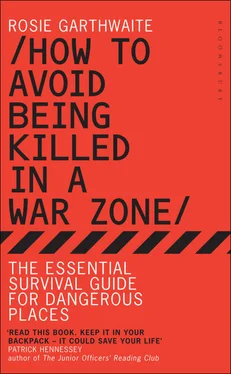Although it often happens in conjunction with dehydration, heatstroke is different. It happens when the ‘thermostat’ in the brain that regulates body temperature breaks down.
Signs of heatstroke
• Headache.
• Dizziness.
• Sweating ceases.
• Hot red skin.
• Quickened and very strong pulse.
• Temperature rises above the normal 37°C.
• Unconsciousness can happen very quickly.
Treatment for heatstroke
• Move the person into the shade and remove their outer clothing.
• Prop up their head and shoulders.
• Wrap the casualty in a wet sheet or clothing and pour cool, but not cold, water on them until their temperature is back to normal.
• If the cooling process is not working, you might need to immerse the patient in cool water, slowly, massaging their limbs to move the cool blood back to the core of the body.
• Slowly feed the patient cool, but not cold, water when they are able to take it.
• Once the patient’s temperature is normal, put dry clothes or a towel or sheet over them and keep them warm.
It is possible to avoid sunburn by staying out of the midday sun, in the shade, covering up with clothes and reapplying sunscreen as needed. You’ll need up to factor 50 in the most extreme situations, such as deserts and snow. Minor sunburn is something most of us have dealt with before. But serious sunburn across more than 50 per cent of the body can be very dangerous, especially in children.
Treatment for sunburn
• Stay out of the sun and rest in a cool place.
• Drink plenty of cool water.
• Immerse the body in cool water whenever possible.
• Do not burst any blisters; protect them with a non-adhesive dressing, if necessary, and stop clothes rubbing where possible.
/SURVIVING IN MOUNTAINOUS TERRAIN
Most mountains provide little shelter, food or water. Unless you are with someone who knows how to live off the fat of that particular mountain, you need to get to a valley and water and safety as soon as possible.
When making a shelter, avoid steep areas or places directly under a large snowfall on a mountain, where there is a risk of an avalanche. The least steep slopes are the safest places. Also, trees provide a break in the event of an avalanche, so it is safe to shelter in front of them.
If you are walking along a ridge of snow and are worried about an avalanche threat ahead, test it by shouting and clapping your hands to see if it is set off. Ninety per cent of people killed in avalanches caused them in the first place by walking or skiing across them, or creating a noise to set them off.
If you’re crossing a large area of snow with other people, tie yourselves together in case one of you falls into an unseen crevice.
If you are caught in an avalanche, use a swimming movement to stay on top of the snow – any stroke that works for you, except butterfly. And if you know which way is up, point your feet downhill.
/SURVIVING POTENTIAL FLOOD ZONES
If you are near the sea, never underestimate how far the water can move with the tide. You can never prepare for a tsunami, but you can look at where locals have their houses and place yourself there. When there is a full moon the tide can be dramatically larger.
Similarly, if you are near a river or lake after a big rainfall or snow melt, look to the locals for advice. Don’t just plant yourself next to a river because it is pretty. Imagine what would happen if a dam was opened upstream. Pitch your camp away from the water, and walk to and fro to collect it for cooking and drinking rather than being right on top of it and in a likely flood zone.
And if, despite your best endeavours, you suddenly find yourself under water and disorientated? Blow a bubble to find the way up.
/SURVIVING IN JUNGLE TERRAIN
In tropical regions you are unlikely to starve or be thirsty once you have established what you can eat and drink. However, the risks are manifold – from the insects, leeches and other revolting things that want to feast on you, to the fact that it is easy to get lost and hard to find your bearings when surrounded by dense vegetation.
Making fire can be tough in the fertile and moist jungle. Find dead wood and strip off the damp outer layers. The inside should be good to fragment for tinder, to break up for kindling and to use as a whole for fuel.
Marc Laban is a founding partner of AsiaWorks, an independent production company, which is super-organized at taking teams into inhospitable terrain. I was playing a round of golf with Marc in the glorious warm rain outside Kathmandu when he had a call from base. There had been a typhoon, followed by flooding and mudslides, in the Philippines. Before we teed off at the next hole he had already deployed teams and chartered planes to the disaster. I was impressed. And he won the game too!
Large parts of Asia are dominated by jungle in all its various forms, and Marc has learnt the tricks of his trade marching through many of them:
‘The jungle trips I’ve taken over the years have provided me with some of my best experiences and stories. But there was one story that beat them all. In 1997 I travelled with Far Eastern Economic Review journalist Nate Thayer and cameraman David McKaige to Anlong Veng, the final stronghold of the Khmer Rouge. Once there, we met the leadership of the Khmer Rouge, who had extended an invitation to interview Pol Pot. Nate and David had already filmed Pol Pot weeks before at a staged trial, but this would be his first “normal” interview in 18 years – and, as it turned out, his last.
‘I spent a lot of time trudging through the jungle along the Thai–Burma and Cambodian borders in my early years in Asia. Normally, you’re travelling with soldiers, and in the case of the Karen – an ethnic group that has been fighting the Burmese government for decades – hardened soldiers, who are not going to be spending any time worrying about how foreign journalists are holding up during a trek.’
One man’s jungle can be another man’s overgrown garden. Staying at a friend’s house in the Seychelles one holiday, I found ants the size of small mice walking across plate-sized flower petals in his tumbling jungle garden. But he didn’t think anything of it. There are many different types of terrain, and each one will have its own challenges. But equatorial rainforests, secondary jungle, subtropical rainforests, montane forests, saltwater swamps and freshwater swamps will all vary widely from kilometre to kilometre within their broad definitions. The best equipment for navigating a jungle is local knowledge and advice. But James Brabazon explains why you shouldn’t take that for granted, and why you must stay in control of the situation:
‘Jungle can be a misleading term. There is no one type of jungle. It can be primary, secondary or tertiary jungle, and each demands a different approach. Very few people indeed actually live in the jungle in West Africa – almost everyone lives in a village – so you won’t find the same level of understanding about it locally that you would, say, in parts of the Amazon. In Liberia most villagers view the forest as malevolent, and stick to the forest paths. They sleep in huts and buildings.
‘We were pursued by a ruthless government army for hundreds of miles through the jungle, and the best thing we could have done to shake them off would simply have been to step off the path – but the group of rebels we were with refused: they were more terrified of the jungle than the government army. In most other places, fighters use the jungle to their advantage, but in Liberia they don’t. Local people there don’t have any idea what lives in the forest either – they told us there were alligators and tigers, but those aren’t even indigenous to Africa!
Читать дальше




![Джонатан Димблби - Barbarossa - How Hitler Lost the War [calibre]](/books/385421/dzhonatan-dimblbi-barbarossa-how-hitler-lost-the-w-thumb.webp)







